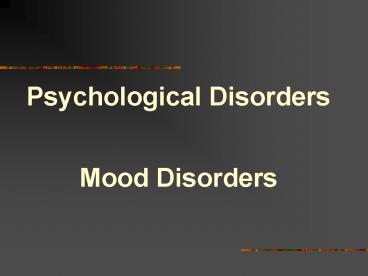Psychological Disorders - PowerPoint PPT Presentation
1 / 10
Title:
Psychological Disorders
Description:
Mood disorders 'are a class of disorders marked by ... 'Manic' periods are characterized by bouts of extreme exuberance and a feeling of invincibility. ... – PowerPoint PPT presentation
Number of Views:52
Avg rating:3.0/5.0
Title: Psychological Disorders
1
- Psychological Disorders
- Mood Disorders
2
Mood Disorders
- Mood disorders are a class of disorders marked
by emotional disturbances that may spill over to
disrupt physical, perceptual, social and thought
processes. - Major depressive disorder is a disorder in which
people show persistent feelings of sadness and
despair and a loss of interest in previous
sources of pleasure. - Onset can occur at any time, but most cases occur
before age 40. - The majority of people with depression (75 95)
will experience a repeat episode.
3
Mood Disorders (cont.)
- Major depressive disorder (cont.)
- Depression is one of the most common mental
illnesses (the lifetime prevalence is 16.2). - However, prevalence is tied to gender. Women are
twice as likely to be diagnosed with depression. - This does not appear to be tied to biological
differences between men and women and could
result from greater stress and abuse that women
experience.
4
Mood Disorders (cont.)
- Bipolar Disorder (once known as manic-depressive
disorder) is marked by the experience of both
depressed and manic periods. - Manic periods are characterized by bouts of
extreme exuberance and a feeling of
invincibility. - However, this state of elation alternates
(sometimes suddenly) with periods of depression.
5
Mood Disorders (cont.)
- Bipolar disorder is much less common than
depression (a unipolar disorder), affecting
about 1 to 2.5 of the population. - Peak age of vulnerability is between 20 and 29.
6
Mood Disorders (cont.)
- Etiology of mood disorders.
- Genetic vulnerability.
- Concordance rates, or the percentage of twin
pairs or other pairs of relatives that exhibit
the same disorder, suggests there is a genetic
basis for mood disorders. - Concordance rates for identical twins is 65 to
72, whereas it is only 14 to 19 for fraternal
twins who share fewer genes but the same
environment.
7
Mood Disorders (cont.)
- Etiology of mood disorders. (cont.)
- Neurochemical factors.
- Mood disorders are correlated with low levels of
two neurotransmitters in the brain - Norepinephrine.
- Seratonin.
- However, it is unclear whether changes in these
chemicals are the cause, or the result, of the
onset of mood disorders.
8
Mood Disorders (cont.)
- Etiology of mood disorders. (cont.)
- Cognitive factors.
- Depression may be linked to negative thinking
(see Figure 15.13). - Specifically, Seligman (1974) proposes that
depression is caused by learned helplessness,
in which people become passive and give up in
times of difficulty. - Learned helplessness is also related to a
pessimistic explanatory style in which people
attribute setbacks to personal flaws.
9
Mood Disorders (cont.)
- Etiology of mood disorders. (cont.)
- Hopelessness theory, is another cognitive
explanation of mood disorders in which other
factors, in addition to a pessimistic explanatory
style, push people into depression. - Such factors include high stress and low
self-esteem. - Nolen-Hoeksema (1991, 2000) also asserts that
those who ruminate about problems put themselves
at risk for depression.
10
Mood Disorders (cont.)
- Etiology of mood disorders. (cont.)
- Interpersonal roots.
- Depression has also been correlated with
interpersonal factors, such as poor social
skills. - However, it is unclear what the direction of
cause and effect is, with regard to this
correlation. - Precipitating stress.
- There is also a link between stress and the onset
of mood disorders.































